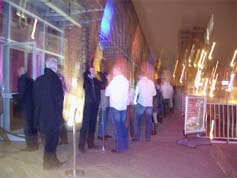Binge-drinking now "the norm"

“A culture of intoxication” has taken hold in the UK, with binge-drinking now the norm for young men and women, according to research from Lancaster University.
Criminologist Dr Fiona Measham and her team carried out a survey of 351 people with an average age of 25 in Manchester city centre’s pubs and clubs.
She said that people were going out with the express aim of getting drunk.
“There’s a new culture of intoxication in relation to alcohol and illegal drugs in this country. People are going out to get drunk and it’s this determined drunkenness which is now the norm.
“What they drink – shots, alcopops and cocktails – has changed so you can drink quicker and faster. The strength of some wines and beers has also gone up by 50 per cent in the last 10 years and we’ve moved from the spit and sawdust pub to one where it’s chrome and cocktail bars so they are pleasant environments for women and professional groups.”
Her research revealed that there was no longer a gender difference between men and women when it came to deciding to get drunk.
“The research confirmed an apparently deliberate and determined drunkenness with no statistically significant gender or age difference in their desired level of intoxication.”
When interviewed, the women had drunk an average of 5.7 units of alcohol and the men 9.6 units – enough to classify them as a “binge-drinker” according to the UK definition of 6 units for women and 8 for men.With the real price of alcohol cheaper than in the 1970s and more liberal licensing laws, Dr Measham said people are drinking more than ever.
“The consequences of a decade of increased sessional consumption of alcohol are evident in increased admissions to accident and emergency units, facial injuries, liver disease, alcohol-related arrests, and in the notable increase in young women involved in these incidents of alcohol-related violence, disorder, injury and harm.”
When asked how drunk they felt on a scale of 1 to 5, both men and women rated themselves at 1.8 early in the evening but both sexes aimed to achieve a rating of 3.8 out of 5 by the end of the night.
“We thought they would all aim to be 5 out of 5 at the end of the night but they showed a controlled state of drunkenness, what I call a controlled loss of control.They would have strategies to get home safely and make sure they had enough money.”
She said that an increasingly consumer society, with its sophisticated marketing, is to blame for binge-drinking along with the deregulation of the licensing laws.
“Increased sessional consumption of alcohol across the last 10 years must be understood within the context of a burgeoning night-time economy which facilitates and promotes consumer excess and intoxication.”
Dr Measham is a nationally renowned researcher with over 15 years’ experience in the field of drug and alcohol use.She has contributed articles on government policy on alcohol to the International Journal of Drug Policy and at the annual conference of the British Criminology Society.